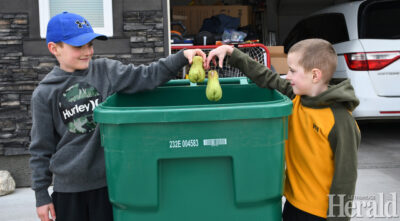City rolls out second phase of green cart program
By Delon Shurtz - Lethbridge Herald on April 14, 2023.
 Herald photo by Delon Shurtz
Eight-year-old Ryker Bourassa, left, and his six-year-old brother Harlan, toss a couple of Chayotes, also called milliton squash or vegetable fruit, into their family's new green cart.
Herald photo by Delon Shurtz
Eight-year-old Ryker Bourassa, left, and his six-year-old brother Harlan, toss a couple of Chayotes, also called milliton squash or vegetable fruit, into their family's new green cart.LETHBRIDGE HERALDdshurtz@lethbridgeherald.com
Eight-year-old Ryker Bourassa was looking forward to the day a green cart would be dropped off at his house on the westside.
When that day came Thursday, he and his younger brother, six-year-old Harlan, excitedly dropped a couple of chayotes, or mirliton squash, into the cart to celebrate the occasion.
The Bourassa family is one of thousands of families who will receive the green carts over the next few weeks. About 2,000 Lethbridge homes received them last year during the first phase of the project, and this week the city began rolling out Phase Two, which will see homes in the rest of the city receive another 32,000 carts for a total of 34,000 single-family households with green carts. These are in addition to their black and blue carts.
“Over the next five weeks we’ll roll across the city and everyone should have a green cart by May 12,” James Nicholls, collections manager for Waste Utility & Environment, said Thursday during a media briefing to discuss green cart delivery and the curbside organics program.
Apartments and condominiums that currently have communal collections are the exception, although the city will conduct an analysis of properties this fall to determine what will work best for them.
For an extra $5 a month on the residential utility bill, green carts will be emptied weekly between May and October on a different day than black-cart pickup, and bi-weekly between November and April.
And instead of getting dumped at the landfill, the organics collected in the green carts will be taken to a processing facility which opens next month at the city’s waste and recycling facility.
Nicholls estimates the green carts will divert about 10,000 tonnes of organics from the landfill, although the City hopes the amount will eventually increase to about 20,000 tonnes.
“We know that there is a significant amount of food waste that can be diverted from the black carts to the green carts, but in our conversations with other municipalities we know that does take time. It’s a significant change of management that needs to happen inside the household.”
Nicholls said the City learned from Phase One that yard waste comprised much of what went into the green carts, and he hopes to see that trend continue in Phase Two. He also wants to see more food waste make it into the green carts.
“We know that over half of what currently goes into the black cart, is something that could make it into the green cart – between yard waste and kitchen waste. So it’s a great opportunity for us to decrease the amount of material that’s going into the landfill.”
Although paper and cardboard should not be put in the green carts, some paper products that have been soiled by food, such as pizza boxes, paper liners, fast food bags, paper napkins, tissues, and parchment paper, are suitable. Kitchen and table scraps such as eggs and egg shells, coffee grounds, filters and tea bags, solid fat, cooking oil and cooking grease, spoiled and unspoiled fruit and vegetables, bread, noodles, meat, fish, poultry and bones are also suitable, as is yard waste such as garden trimmings, leaves, grass clippings, (no rolls of sod), branches no larger than five centimetres in diameter and one-metre long, and house and garden plants.
Plastic bags, even biodegradable bags, are not allowed in the green carts, and neither are compostable bags, paper cups, plastic containers, even if they are compostable or biodegradable, coffee pods, foam trays, fruit and vegetable stickers, hygiene products, paper towels with cleaning products on them, dryer sheets and dryer lint, diseased branches, rocks and gravel, firepit and barbecue ashes, construction materials, vehicle oil, kitty litter, animal waste, animal carcasses and medications.
Nicholls said the response from residents who received green carts in Phase One has generally been positive, and many were surprised how much material they could divert to the green cart. However, some plastics still made their way into the carts, suggesting the City needs to continue educating residents.
Follow @DShurtzHerald on Twitter
17-16




